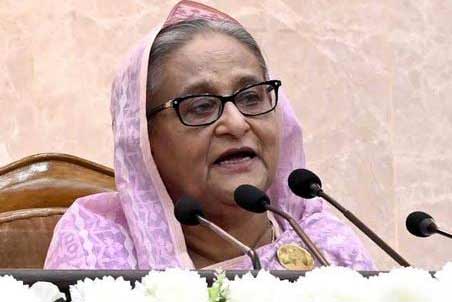
Published :
Updated :

Prime Minister Sheikh Hasina has questioned whether the quota protesters who sarcastically referred to themselves as ‘Razakars’ in response to her remarks on the movement know their history.
The premier asked whether they knew of the Pakistani collaborators’ part in the 1971 genocide and the brutal abuse of the women in the country.
She expressed her surprise at the slogans they chanted, saying: “They did not see the bodies lying in the streets and so they are not ashamed to call themselves Razakars.”
She made the comments at the signing of the Annual Performance Agreement for the 2024-25 fiscal year and the presentation of the APA and Purity Award at the Prime Minister’s Office on Monday.
“Our sole goal is to maintain the spirit of the Liberation War,” the prime minister said. “Millions of martyrs shed their blood. Hundreds of thousands of mothers and sisters were abused. Their contributions should not be forgotten. Given the way the Pakistani attack force and the Razakar forces tortured this country, I feel extremely sad when I hear students at Rokeya Hall say they are Razakars.”
“Do they know what happened there on Mar 25, 1971? Three hundred girls were killed, 40 were raped. They were abducted and taken to the Pakistani camps. They were not allowed to wear sarees or shawls because they would attempt to hang themselves with them. They were only allowed to wear one bit of cloth. They were brutally tortured day after day.”
Referring to an incident where one of the girls was rescued, Hasina said, “A Sikh soldier from our allies in India took off his turban and used the cloth to cover one of the rescued girls. That is just one incident. There were many more like it.”
“Or, the girl who was abducted from Pirojpur. They made her cook and abused her. But, when she got the chance, she crossed the river to Chitmari to bring information on them to the freedom fighters. When she was caught, they tied her legs to two cars and tore her apart.”
The prime minister said, “They did not see these horrors, or the bodies lying on the road and so they have no shame in referring to themselves as Razakars. Those forces looted the people and tortured them. We took action against them. We even brought them to justice and hanged them. Those they oppressed were granted justice.”
“It is unfortunate to hear girls chanting such slogans. Then I wonder – what country are we living in? I wonder what ideals they believe in. Who taught them? And what did they learn? That is my question.”
The contributions of freedom fighters should not be forgotten, Hasina said.
“The Liberation War is a point of pride for us. The people of this country left their homes and families - left everything, even their fear of their own lives – behind to answer the call of the Father of the Nation and fight a war. They won. The people in the Razakar forces abused the people of our country. We cannot forget that. We must move forward in the spirit of the Liberation War. Only then will we progress.”
“What did those who came to power after 1975 give this country? They weren’t able to give anything? But we, who believe in the spirit of the Liberation War, have worked whenever we have come to power. Bangladesh, which has changed in the past 15 years, is a role model for development.”


 For all latest news, follow The Financial Express Google News channel.
For all latest news, follow The Financial Express Google News channel.